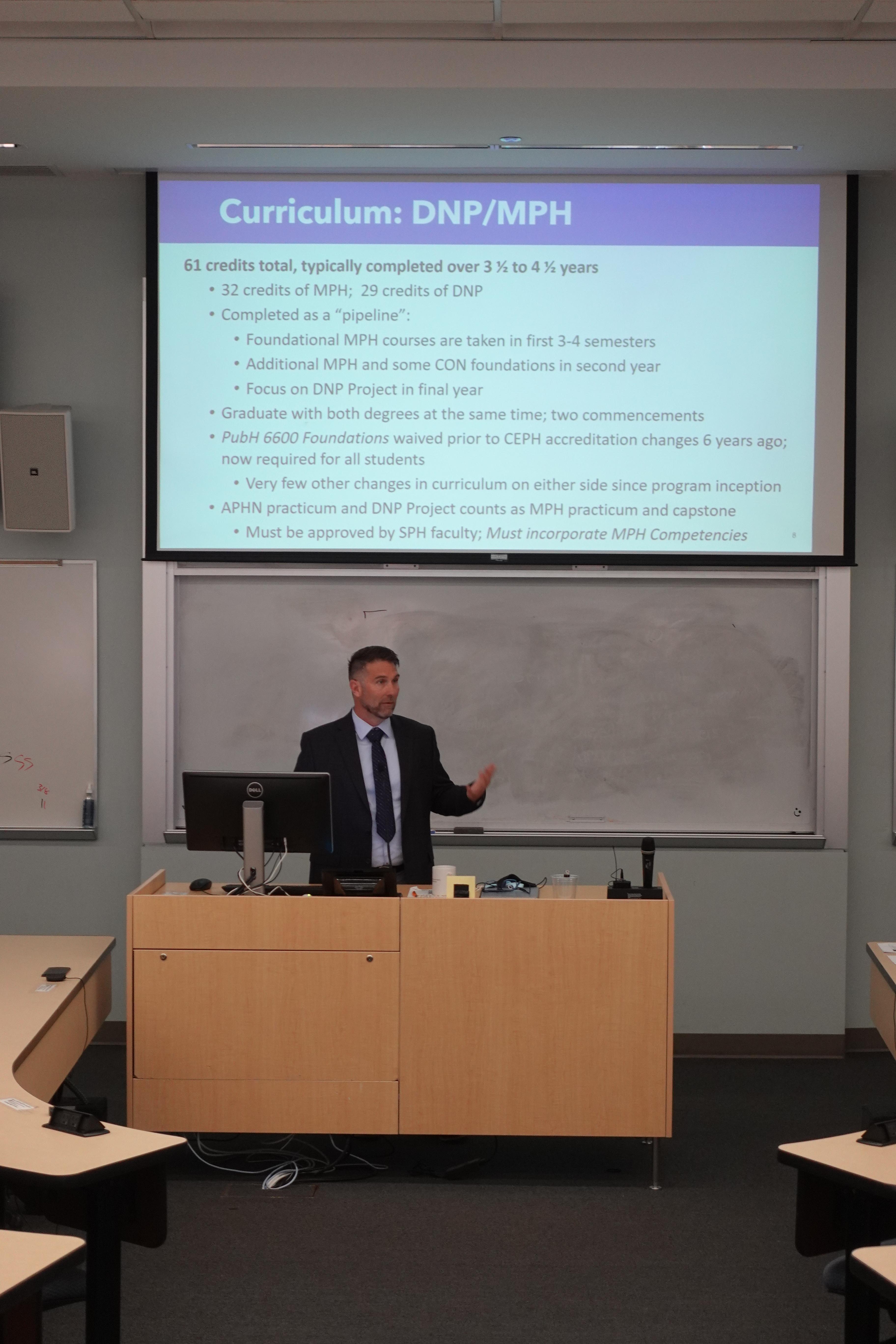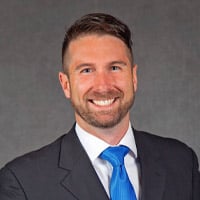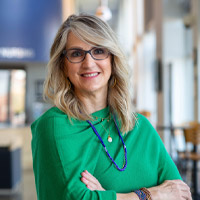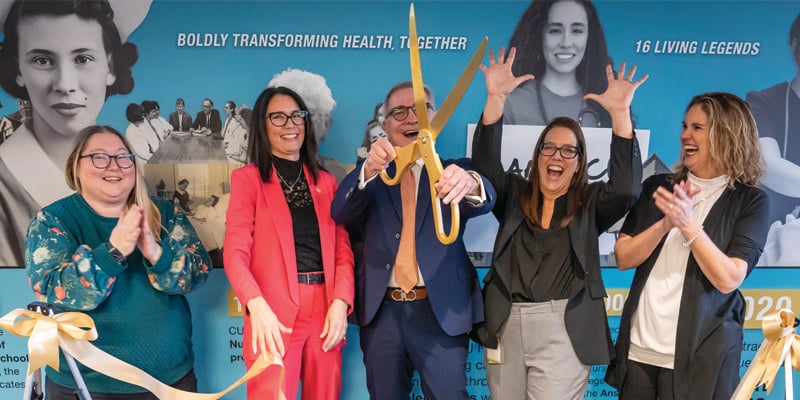The University of Colorado College of Nursing at Anschutz Medical Campus is a leader in nursing education in Colorado.
It includes the college’s Doctor of Nursing Practice, Master of Public Health (DNP/MPH) dual-degree program. Students earn a DNP from CU Nursing and a Master of Public Health degree from the Colorado School of Public Health. One of over just a dozen in the country, CU Nursing’s program has seen 33 students graduate since its inception in 2014.
The program’s Director and Professor of Clinical Teaching, Scott Harpin, PhD, MPH, RN, APHN-BC, FNAP, and Associate Professor Kathy Shaw, DNP, RN, recently gave an overview of the program to celebrate its ten years of existence during a Grand Rounds presentation. They surveyed program alumni to get feedback and find out where their careers have taken them.
Twenty alums responded to their questionnaire. Eleven had a new job or a new position within six months of graduation. And, the majority felt the program was worth the financial investment.
Sara Greene, DNP, APRN, graduated from the program in May 2019. She has worked her entire career in public health and was interested in a program focusing on public health.
 CU Nursing's Scott Harpin, PhD, MPH, RN, APHN-BC, FNAP, presenting on the college's Doctor of Nursing Practice, Master of Public Health (DNP/MPH) dual-degree program. |
“I came in with a wealth of public health knowledge experience, and education already, so for me, the program was really about learning the leadership aspects and focusing on program evaluations,” she says.
Her program evaluation focused on a healthcare system’s readiness for a noroviral outbreak at Children’s Hospital Colorado and UCHealth. Six months later, the pandemic happened.
“I spent three and a half years after earning my degree focused on COVID-19 response,” she says. “And that’s led me to a new career opportunity with HCA Healthcare. I’ll be developing metrics to determine the level of readiness of all HCA hospitals, which is about 180 facilities. So it’s a full-circle moment.”
Major James Waters, DNP, MPH, CPH, graduated in August 2020.
“Earning both an MPH and DNP has propelled my career in the Army beyond my expectations,” he says. “When my cohort partner and I graduated, we were the only operational public health nurses in the Army’s inventory to have earned both degrees, and the only Army public health nurses to have doctoral training.”
Since graduating, Waters has served as a public health nursing expert and consultant to the Army Surgeon General. He’s also led public health workforce development initiatives across the world and is a key contributor to COVID-19 messaging and risk communication for the Army.
He currently works as the Director of the Department of Public Health, serving all Army personnel and their families in Japan.
“The strong foundation in public health that this program provided has been fundamental in allowing me to better serve my population and contribute to the growth of my peers and subordinates in Army Public Health,” he says.
Educating Public Health Leaders
Harpin says CU Nursing started the program because data was showing a need to better educate leaders in public health professions. There’s also a downward trend of public health nurses in that workforce, an issue Harpin says is “concerning”.
“Most students don’t know what a public health nurse does, and all of the different opportunities out there are a big part of being a public health nurse. If anyone is thinking of going into public health, they should reach out to their local health department and ask to shadow a public health nurse. I did it, and it’s the best experience because you’ll learn about all sorts of things you didn’t realize were a part of public health.” — Sara Greene, DNP, APRN, 2019
“I hate to say it, but we’re kind of a dying breed,” he says. “It’s sometimes hard for us teaching in undergrad programs to get nurses to commit to working in public health for the first time because less pay is a form of inhibition. So these are all issues we think about, even while we’re advocating for this education model and education program.”
Program Basics
The DNP/MPH dual-degree program is 61 credit hours. It typically takes a student three-and-a-half to four-and-a-half years to complete. Examples of courses include Intro to Health Systems Management Policy, Epidemiology, and Social Behaviors Factors and Health. Students can also take electives, allowing them to tailor their education to their interests.
Interested in LearningAbout Public Health Nursing? |
|
Greene says she would be happy to talk to nurses or current students who want to learn more about public health. Anyone with questions can email her: sara.greene@hcahealthcare.com.
Dr. Harpin is always available to learn more about the program at scott.harpin@cuanschutz.edu. |
“Most of the foundational courses are done in the first three to four semesters,” Harpin says. “Then, students have to take some classes in both public health and nursing, concurrently. Then the final year focuses on a DNP project which double-counts for their MPH capstone.”
“You have half your classes with CU Nursing and the other half with the School of Public Health, so it’s the best of both worlds. And that’s what you need to become a successful public health nurse,” Greene says. “You need to understand both sides, and this program gives you that.”
“Students and alumni alike appreciate having two disciplinary perspectives in their graduate education,” Harpin says. “The MPH coursework and advanced public health nursing complement each other so well and tend to open doors for our graduates in ways just one degree may not.”
The Program’s Future
Harpin says it’s important for graduate programs in advanced public health and nursing to meet the needs of potential students and be willing to adapt to the changing healthcare landscape. He meets with leaders from other US universities with similar programs to share curriculum and discuss the specialty’s future.
“We’re all appealing to the same students with our programs, but we also need to talk about ways to survive either as a specialty or subspecialty and find out ways to do that collaboratively,” he says. “Public health nurses can go get their master’s in public health alone. There are so many options for advanced degrees, and we need to show why nursing education is so special.”





